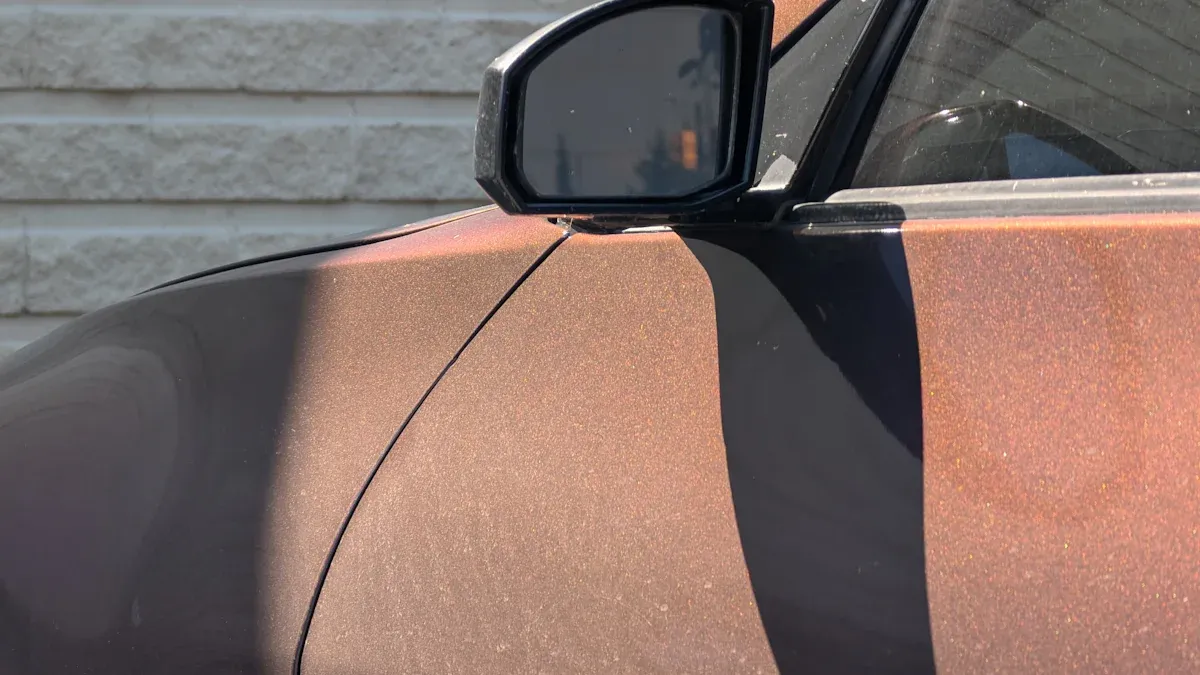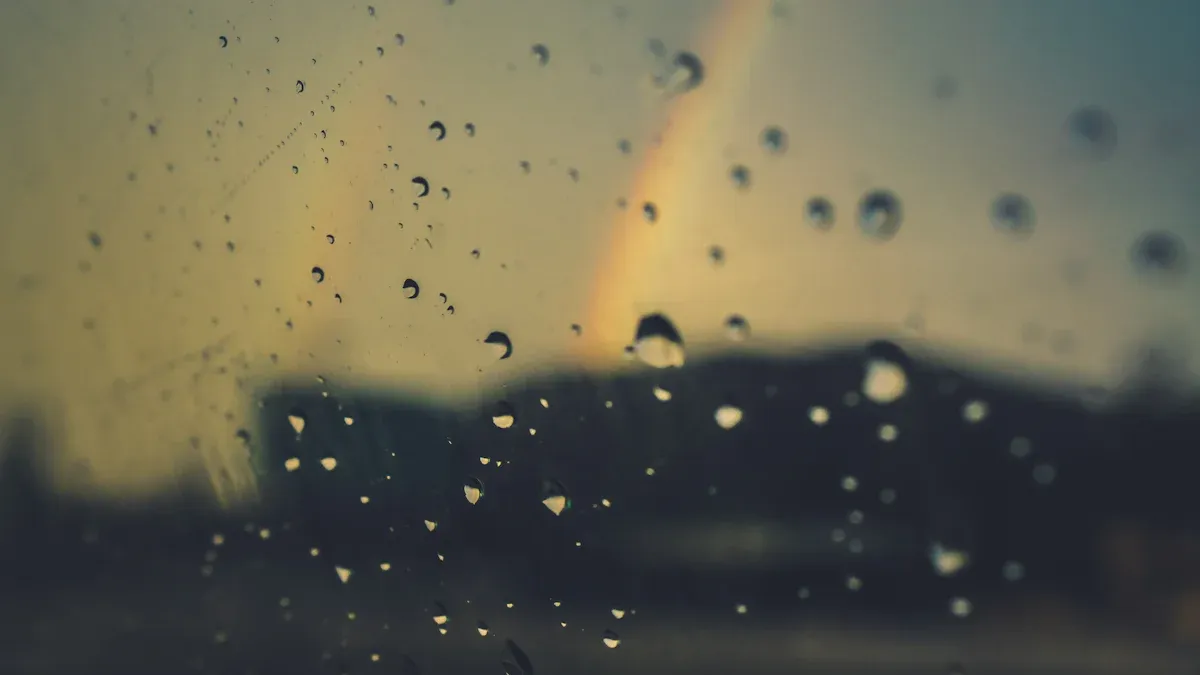An excellent car vinyl wrap like Ravoony grape purple vinyl wrap gives your vehicle a stunning, custom look. You invested in this upgrade, so you want it to last. However, constant exposure to the elements presents a significant challenge. The effects of sun and rain can severely degrade your wrap's appearance and lifespan. Sun exposure causes fading and cracking, while rain leaves damaging mineral deposits. Understanding these threats is the first step toward protecting your investment.
Note: Parking location significantly impacts your wrap's longevity. A garaged vehicle can gain years of life compared to one left in the sun.
| Storage Condition | Impact on Lifespan |
|---|---|
| Garaged vehicles | Adds 2-3 years |
| Full sun exposure | Reduces by 1-2 years |
| Covered parking | Adds 1-2 years |
| Partial shade | Optimal outdoor condition |
Key Takeaways
- Sun and rain damage car wraps. Sun causes fading and cracking. Rain leaves spots and can lift edges.
- Protect your car wrap. Park in shade or a garage.
- Clean your car wrap often. Wash it by hand with mild soap. Dry it well to stop water spots.
How the Sun Degrades Your Vinyl Wrap

The sun is a powerful force that can significantly shorten your vinyl wrap's life. Its intense energy attacks the material on multiple fronts, from its color to its structural integrity. Understanding these specific Effects of Sun and Rain helps you protect your investment.
UV Fading and Discoloration
You may notice your wrap's vibrant color dulling over time. This is caused by ultraviolet (UV) radiation. The sun's UVB rays, in particular, are highly energetic and break down the chemical bonds in the wrap's color pigments. This process, known as photodegradation, causes the color to fade. UV exposure also triggers chemical reactions within the PVC polymer itself.
- It causes dehydrochlorination, which releases damaging compounds.
- It breaks down polymer chains, weakening the material.
- It creates new groups like carbonyls (C=O), leading to discoloration.
Higher-quality cast vinyls contain more UV inhibitors to resist this damage, while lower-grade calendered films fade much faster.
Heat Damage and Cracking
Your vehicle's surface gets hot in the sun, causing the vinyl to expand. As it cools, it contracts. This constant cycle of thermal expansion and contraction creates stress on the wrap. Over time, this stress leads to the formation of tiny micro-cracks. Intense UV irradiation accelerates this process by making the vinyl brittle. Eventually, these small cracks can grow, giving the wrap a worn and fractured appearance.
Adhesive Weakening and Peeling
The sun's heat doesn't just damage the vinyl film; it also compromises the adhesive holding it to your car.
High temperatures can soften the wrap's adhesive, causing it to lose its grip. This often results in the edges of the wrap lifting and peeling away from the vehicle's surface.
Once an edge begins to lift, it creates an entry point for moisture and dirt, accelerating further peeling and failure of the wrap.
Understanding the Effects of Rain

While the sun attacks your wrap with heat and UV rays, rain brings its own set of challenges. Water might seem harmless, but its chemical composition and behavior can cause significant damage.
Acid Rain and Chemical Etching
You cannot see the acids in rainwater, but your wrap can feel them. Rainwater absorbs pollutants from the air before it ever hits your vehicle.
- Sulfur dioxide
- Nitrogen oxides
When the water evaporates, it leaves these corrosive acids behind. The acids then eat into the vinyl's top layer, creating dull spots or permanent texture changes known as chemical etching. This damage is often irreversible without professional intervention.
Hard Water Spots and Mineral Buildup
After a rain shower or a quick rinse with tap water, you may notice chalky white spots on your wrap. These are mineral deposits left behind by hard water. The water itself evaporates, but minerals like calcium and magnesium cling to the surface. If you do not clean them off promptly, these deposits can bond with the vinyl and etch into the finish, similar to acid rain.
Pro Tip: To remove stubborn mineral spots, you can use a dedicated vinyl film cleanser. Spray it on the affected area, let it sit for a few minutes, and then gently wipe it away with a clean microfiber towel. You might need to repeat the process for tougher spots.
Moisture Seepage Under Edges
Water has a sneaky way of getting into places it shouldn't. Through a process called capillary action, water can pull itself into the tiny gaps along the edges of your vinyl wrap. Once moisture gets trapped underneath, it weakens the adhesive and prevents the area from drying out. This trapped moisture is one of the most damaging Effects of Sun and Rain, leading directly to edge lifting, bubbling, and eventual wrap failure.
Your Proactive Protection and Maintenance Guide
You can actively fight back against the elements. A consistent maintenance plan is your best strategy for preserving your wrap's color and integrity. This guide will show you how to shield your vehicle from both sun and rain, ensuring it looks great for years.
Shielding Your Wrap from the Sun
The sun's UV rays and heat are relentless, but you can take simple steps to minimize their impact. Your first line of defense is smart parking. Parking in a garage or under a covered structure is the most effective way to protect your wrap. If that is not an option, seek out shaded spots or use a high-quality, breathable car cover.
Defending Your Wrap from Rain
Rainwater contains pollutants and minerals that etch and stain your wrap. Your goal is to prevent water from sitting on the surface.
Hydrophobic coatings are your best weapon here. Ceramic coatings use nanotechnology, specifically silicon dioxide (SiO₂), to create an ultra-smooth surface. This technology prevents water from gripping the vinyl. Instead, water beads up and rolls right off, taking dirt and minerals with it. This action dramatically reduces the chance of water spots forming.
After a heavy downpour, you should take immediate action.
- Rinse: Use clean water to rinse off any loose dirt and acidic deposits.
- Wash: Use a pH-neutral, wrap-safe soap and a soft microfiber mitt to gently wash the surface.
- Dry: Thoroughly dry the vehicle with a clean microfiber towel or an air blower. Pay special attention to edges and seams to prevent moisture from getting trapped underneath.
The Essential Long-Term Care Routine
A consistent routine is crucial for your wrap's health. You should adjust your care based on the season, increasing washing frequency in winter to remove salt and applying UV protectants more often in summer.
Washing and Care Best Practices
| Do ✅ | Don't ❌ |
|---|---|
| Hand wash every two weeks. | Use automated car washes. |
| Use a pH-neutral, wax-free soap. | Use harsh or citrus-based cleaners. |
| Use the two-bucket wash method. | Use wax or polish on matte finishes. |
| Address bird droppings immediately. | Let contaminants sit on the surface. |
Your vinyl wrap faces a constant battle against the elements. The sun's UV rays and heat cause fading and peeling, while rainwater creates chemical etching and mineral spots. You can combat these Effects of Sun and Rain. Proactive care, including smart parking, regular washing, and applying protectants, is crucial for preserving your wrap.
FAQ
How long does a vinyl wrap last?
A high-quality vinyl wrap typically lasts five to seven years. Your maintenance routine and exposure to the elements will directly impact its lifespan. Proper care extends its life.
Will a vinyl wrap damage my car's paint?
No, a wrap will not damage your car's original paint. A professionally installed wrap actually protects the factory paint from UV rays, scratches, and minor chips.
Can I take my wrapped car through an automatic car wash?
You should avoid automatic car washes. The harsh brushes and strong chemicals can scratch, lift, or peel the edges of your vinyl wrap, causing permanent damage.




























0 Comments